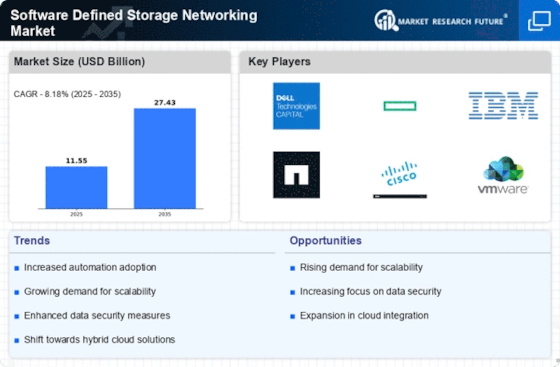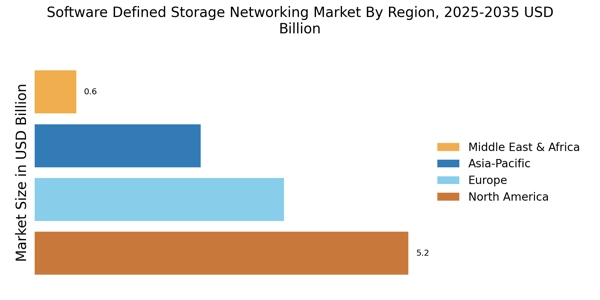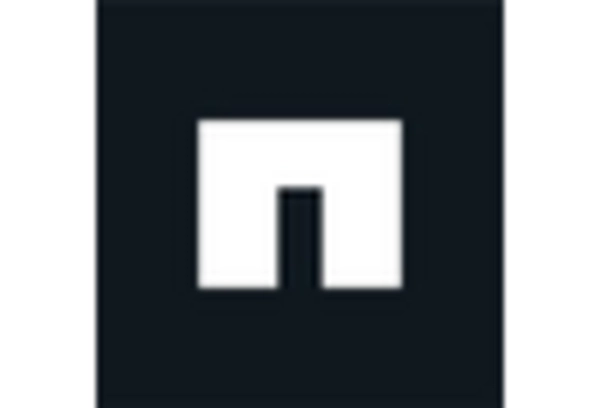Rising Demand for Scalability
The Software Defined Storage Networking Market is experiencing a notable increase in demand for scalable storage solutions. Organizations are increasingly seeking storage systems that can grow in tandem with their data requirements. This trend is driven by the exponential growth of data generated across various sectors, necessitating flexible storage options. According to recent estimates, the storage capacity required by enterprises is projected to increase by over 30% annually. As a result, software-defined storage solutions that offer seamless scalability are becoming essential for businesses aiming to optimize their storage infrastructure. This demand for scalability is likely to propel the Software Defined Storage Networking Market forward, as companies prioritize solutions that can adapt to their evolving needs.
Enhanced Data Management Capabilities
The Software Defined Storage Networking Market is witnessing a surge in demand for enhanced data management capabilities. As organizations grapple with vast amounts of data, the need for efficient data handling and retrieval becomes paramount. Software-defined storage solutions offer advanced features such as automated data tiering, deduplication, and real-time analytics, which facilitate better data management. These capabilities not only improve operational efficiency but also enhance data accessibility and security. The increasing complexity of data environments is driving organizations to adopt solutions that provide comprehensive data management functionalities. This trend is expected to bolster the Software Defined Storage Networking Market as businesses seek to streamline their data operations.
Integration with Emerging Technologies
The Software Defined Storage Networking Market is being propelled by the integration of emerging technologies such as artificial intelligence and machine learning. These technologies enhance the capabilities of software-defined storage solutions, enabling predictive analytics and automated management. By leveraging AI and machine learning, organizations can optimize storage performance, predict failures, and automate routine tasks. This integration not only improves operational efficiency but also enhances the overall user experience. As businesses increasingly adopt these advanced technologies, the demand for software-defined storage solutions that can seamlessly integrate with them is expected to rise. This trend is likely to further stimulate growth in the Software Defined Storage Networking Market.
Cost Efficiency and Resource Optimization
Cost efficiency remains a pivotal driver in the Software Defined Storage Networking Market. Organizations are increasingly focused on optimizing their IT budgets, leading to a growing preference for software-defined storage solutions that reduce hardware dependency. By leveraging virtualization and automation, these solutions can significantly lower operational costs. Reports indicate that businesses can achieve up to 40% savings in storage costs by adopting software-defined approaches. This financial incentive is compelling many enterprises to transition from traditional storage systems to more cost-effective software-defined alternatives. Consequently, the emphasis on cost efficiency is likely to sustain the growth trajectory of the Software Defined Storage Networking Market.
Growing Need for Disaster Recovery Solutions
The Software Defined Storage Networking Market is significantly influenced by the growing need for robust disaster recovery solutions. Organizations are increasingly recognizing the importance of data protection and business continuity in the face of potential disruptions. Software-defined storage systems offer enhanced backup and recovery options, enabling businesses to safeguard their critical data effectively. The market for disaster recovery solutions is projected to grow at a compound annual growth rate of over 20%, reflecting the urgency for reliable data recovery mechanisms. This heightened focus on disaster recovery is likely to drive the adoption of software-defined storage solutions, as organizations prioritize resilience in their IT infrastructure.

















